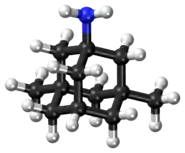美金刚胺
美金刚胺(Memantine)是用于减缓中度至重度阿尔茨海默症进展的药物[2][3],通过口服使用。[2]
 | |
 | |
| 臨床資料 | |
|---|---|
| 商品名 | Axura, Ebixa, Namenda, others[1] |
| AHFS/Drugs.com | Monograph |
| MedlinePlus | a604006 |
| 核准狀況 | |
| 懷孕分級 |
|
| 给药途径 | 口服 |
| ATC碼 | |
| 法律規範狀態 | |
| 法律規範 |
|
| 藥物動力學數據 | |
| 生物利用度 | ~100% |
| 药物代谢 | 肝(<10%) |
| 生物半衰期 | 60–100 小时 |
| 排泄途徑 | 肾 |
| 识别 | |
| |
| CAS号 | 19982-08-2 |
| PubChem CID | |
| IUPHAR/BPS | |
| DrugBank | |
| ChemSpider | |
| UNII | |
| KEGG | |
| ChEMBL | |
| CompTox Dashboard (EPA) | |
| ECHA InfoCard | 100.217.937 |
| 化学 | |
| 化学式 | C12H21N |
| 摩尔质量 | 179.31 g·mol−1 |
| 3D模型(JSmol) | |
| |
| |
美金刚胺的常见副作用包括头痛、便秘、嗜睡和头晕,[2][3]严重的副作用可能包括血栓、精神病和心力衰竭。[3]它的作用机理认为是阻挡N-甲基-D-天冬氨酸受体。[2]
在美国于2003年批准用于美金刚胺医疗用途。[2]它可作为通用名药物使用。[3]2019年,美金刚胺是美国第169常用的处方药,有超过三百万张处方。[4][5]
醫療用途
阿尔茨海默症與失智症
美金刚胺用於治療中度至重度阿尔茨海默症,尤其是使用乙醯膽鹼酶抑制劑耐受性不佳或是有禁忌症的病人。[6][7]有治療指引建議對於早期至中度失智症病人可考慮使用美金剛胺或乙醯膽鹼酶抑制劑。[8]
研究顯示美金剛胺可造成中等程度的症狀改善,[9]對於中度至重度阿茲海默症病人可帶來認知、性情、行為、日常活動方面,有小的正面效應。[10][11]但對於早期病人似乎並無益處。[12]
在2017年的一篇回顧文獻指出,對於中度至重度失智症病人,併用美金剛胺與多奈哌齐(Donepezil)可帶來有限的改善。[13]英國英國國家健康與臨床卓越機構(National Institute for Health and Clinical Excellence; NICE)在2018年提出了治療指引,建議對於中度至中度失智症病人可考慮併用美金剛胺與多奈哌齐。[14]
参见
- 3-羟基苯环己哌啶
- Rhynchophylline
参考资料
- . Drugs.com. [7 August 2017]. (原始内容存档于2019-04-25).
- . Drugs.com. American Society of Health-System Pharmacists. [3 March 2019]. (原始内容存档于2019-04-25) (英语).
- 76. Pharmaceutical Press. 2018: 303–304. ISBN 9780857113382.
- . ClinCalc. [16 October 2021]. (原始内容存档于2020-03-18).
- . ClinCalc. [16 October 2021]. (原始内容存档于2022-01-03).
- Mount C, Downton C. . Nature Medicine. July 2006, 12 (7): 780–784. PMID 16829947. doi:10.1038/nm0706-780
 .
. - NICE review of technology appraisal guidance 111 January 18, 2011 Alzheimer's disease - donepezil, galantamine, rivastigmine and memantine (review): final appraisal determination 的存檔,存档日期21 March 2019.
- Page AT, Potter K, Clifford R, McLachlan AJ, Etherton-Beer C. . Internal Medicine Journal. October 2016, 46 (10): 1189–1197. PMC 5129475
 . PMID 27527376. doi:10.1111/imj.13215.
. PMID 27527376. doi:10.1111/imj.13215. - McShane R, Westby MJ, Roberts E, Minakaran N, Schneider L, Farrimond LE, et al. . The Cochrane Database of Systematic Reviews. March 2019, 3 (3): CD003154. PMC 6425228
 . PMID 30891742. doi:10.1002/14651858.CD003154.pub6.
. PMID 30891742. doi:10.1002/14651858.CD003154.pub6. - van Dyck CH, Tariot PN, Meyers B, Malca Resnick E. . Alzheimer Disease and Associated Disorders. 2007, 21 (2): 136–143. PMID 17545739. S2CID 25621202. doi:10.1097/WAD.0b013e318065c495.
- Schneider LS, Dagerman KS, Higgins JP, McShane R. . Archives of Neurology. August 2011, 68 (8): 991–998. PMID 21482915. doi:10.1001/archneurol.2011.69
 .
. - Chen R, Chan PT, Chu H, Lin YC, Chang PC, Chen CY, Chou KR. Chen K , 编. . PLOS ONE. 21 August 2017, 12 (8): e0183586. Bibcode:2017PLoSO..1283586C. PMC 5565113
 . PMID 28827830. doi:10.1371/journal.pone.0183586
. PMID 28827830. doi:10.1371/journal.pone.0183586  .
. - . www.nice.org.uk. [6 August 2020]. (原始内容存档于12 August 2020).
- Bartoli F, Cavaleri D, Bachi B, Moretti F, Riboldi I, Crocamo C, Carrà G. . Journal of Psychiatric Research. November 2021, 143: 230–238. PMID 34509090. S2CID 237485915. doi:10.1016/j.jpsychires.2021.09.018.
- Parr J. . BMJ Clinical Evidence. January 2010, 2010. PMC 2907623
 . PMID 21729335.
. PMID 21729335. - Hong MP, Erickson CA. . Expert Opinion on Investigational Drugs (Informa UK Limited). August 2019, 28 (8): 709–718. PMID 31352835. S2CID 198967266. doi:10.1080/13543784.2019.1649656.
扩展阅读
- Lipton SA. . Current Alzheimer Research. April 2005, 2 (2): 155–65. PMID 15974913. doi:10.2174/1567205053585846.
外部链接
- . Drug Information Portal. U.S. National Library of Medicine. [2022-02-15]. (原始内容存档于2022-02-15).
This article is issued from Wikipedia. The text is licensed under Creative Commons - Attribution - Sharealike. Additional terms may apply for the media files.